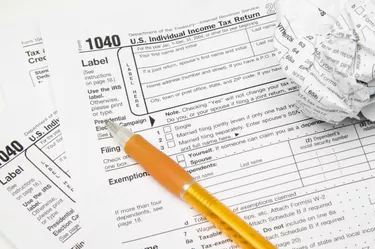
Every year, the IRS collects hundreds of millions of tax filings. Whether you're self-employed or work for an employer, you must pay income tax on your total earnings. When you're filling out your tax forms, you'll notice that it's possible to claim certain deductions and credits that reduce your tax burden.
While there are numerous types of tax benefits that you could qualify for, one exemption used to center around the number of dependents you have. Before you fill out your annual tax form, you should understand the difference between an exemption and a dependent as well as what dependent credits are available now.
Video of the Day
Video of the Day
What Does Income Tax Refer to?
The amount of earnings you have during a given year will determine how much income tax you will need to pay. Along with your base salary, earnings can include any tips you obtain as well as investment income. Your annual income tax burden can be reduced by claiming one or more deductions or credits.
For instance, some of your business expenses could be deducted. Any tax-deferred savings in retirement accounts can also be deducted. One of tax benefits provides you with a credit involves any dependents you currently have and are able to claim on your tax return.
What Is a Dependent Exemption?
A basic exemption is something that reduces the amount of income that's taxable.. If you obtain an exemption of $4,000 and earned $100,000 during the year, your taxable income would be reduced to $96,000.
Before 2018, it was possible to reduce taxable income by $4,300 per dependent by exemption. However, The Tax Cuts and Jobs Act of 2017 eliminated both personal and dependent exemptions, at least through 2025. Instead, you may qualify for tax credits for child dependents and relative dependents.
For example, if you have children who would qualify as dependents, you may be able to claim the child tax credit. This credit directly reduces your tax liability. If your credit is higher than your tax liability, you could receive a refund for the remaining amount. The Child Tax Credit for 2021 is set to $3,600 for any child of yours below the age of six and $3,000 for any child between the ages of 6-17.
Difference Between Dependent and Qualifying Child
A dependent can be a child or relative who lives with you during the year and is supported by you for at least 50 percent of their everyday expenses. The relative who you want to claim as a dependent must live with you for the entire year and will need to bring in less than $4,300 in gross income.
The reason that a dependent can be different from a qualifying child is because qualifying children can be claimed on your tax return if you want to receive the Child Tax Credit, which isn't available with relative dependents. As mentioned above, you can claim a tax credit of as much as $3,600 for every qualifying child. As for qualifying relative dependents, the tax credit can be as high as $500 per dependent.
Difference Between an Exemption and a Dependent
Prior to the TCJA, a tax exemption for dependents was something you could get to lower your taxable income. In turn, this meant that the amount of taxes you owed was also reduced. Now, you can get a dependent exemption, but you can take advantage of the Child Tax Credit or Credit for Other Dependents to get tax benefits for qualified dependents.
A dependent is someone who relies on you for financial support; children and relatives can qualify as dependents. Qualifying children can include your daughter, son, stepchild, descendant, or foster child. The child needs to be less than 19 years old to qualify. If your child is a full-time student at college, they could qualify for a dependent tax credit if they are under 24 years old.
With this guide in hand, you should be ready to file your 2021 tax return. While you can't get a dependent exemption this tax year or the next few years, understanding the remaining dependent credit options available will help you calculate the tax benefits you might get.